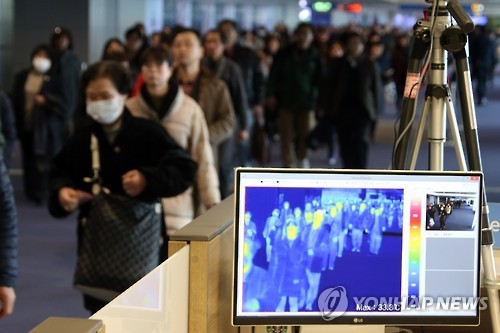The number of foreign patients diagnosed with tuberculosis in Korea has rapidly risen over the past five years, with government vowing to step up prescreening for foreign visitors to stop the disease from spreading here.
According to data compiled by Korea Centers for Disease Control and Prevention, the number of foreign patients diagnosed with TB surged nearly threefold from 637 in 2009 to 1,858 in 2014 over the past five years.
 |
(Yonhap) |
As of 2014, 63 percent of the TB patients were men. By age, the majority of TB patients, or 34.2 percent, were in their 20s, followed by 19.7 percent in their 30s, 18.1 percent in their 50s, 17.3 percent in their 40s and 6.5 percent in their 60s.
Korea tops the list of Organization for Economic Cooperation and Development nations for tuberculosis occurrences and death rate for the disease.
Tuberculosis is a treatable and curable disease, but drug treatment requires that a number of antibiotics be taken for a prolonged period of time, usually six to nine months. According to the World Health Organization, TB is second only to AIDS as the greatest killer among infectious diseases.
In response, the government said Tuesday that it would tighten rules for people applying for long-term visas as part of its efforts to prevent the spread of infectious disease in the nation.
The Justice Ministry said that in partnership with the Korea Centers for Disease Control and Prevention, it will step up monitoring and screening on foreign visitors from countries with a high record of TB cases.
Countries considered at high risk of TB are those that have more than 50 cases per 100,000 people. Health authorities have identified 18 countries, including Nepal, Russia, Vietnam, Mongolia, Indonesia, China, as having the highest risks of TB infection.
People from those countries who wish to reside in the country for more than 91 days are required to submit their medical records to the immigration office after receiving a checkup at a state-designated hospital.
The health authorities also revealed beefed-up measures for foreign workers not getting treatment or not taking necessary medication despite being diagnosed with TB as well as those suspected of entering the country to benefit from cheap medical costs for TB treatment.
The foreign patients, like local residents, can receive medication and treatment free of charge from community health clinics. Foreign nationals suspected of visiting purely for cheaper healthcare or skipping treatment will be put under intensive monitoring by the health authorities, and can be subject to deportation upon their recovery, the KCDCP said.
“There are people who we suspect of coming to Korea to treat TB cheaply. We have seen some foreigners who go straight to hospitals to treat TB as soon as they arrive in Korea,” an official from KCDCP told The Korea Herald.
According to a 2014 survey by TB-specialized hospitals on 134 foreign patients, 28 percent of them were assumed to have entered the country for cheap medical treatment, she said.
“It is more difficult for us to manage and monitor foreign TB patients because they tend to move around the country without a certain residence. And there are also language barriers too,” she said. “We are trying to tighten the monitoring.”
But those who are legally staying in the country and have contracted TB can still reside in Korea as long as they receive check-up and treatment under the government’s guidelines, according to the KCDCP.
“It is understandable that the government steps up pre-screening on foreign workers to prevent the spread of the disease,” said Lee Kyung, an activist for Human Rights Center for Migrant Workers.
“But I am a bit worried that the Justice Ministry might abuse the system to keep foreigners out. Assuming that foreigners enter the country to seek cheap TB treatment -- I don’t think that’s entirely true.”
By Ock Hyun-ju (
laeticia.ock@heraldcorp.com)







![[Today’s K-pop] Blackpink’s Jennie, Lisa invited to Coachella as solo acts](http://res.heraldm.com/phpwas/restmb_idxmake.php?idx=644&simg=/content/image/2024/11/21/20241121050099_0.jpg)
